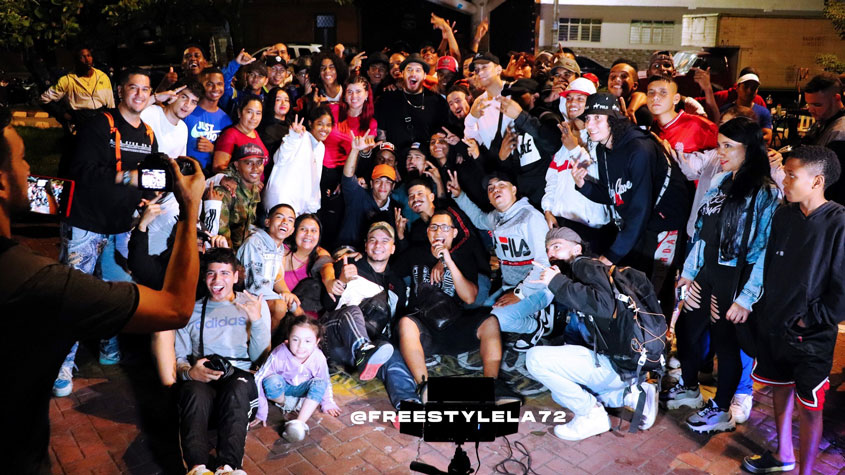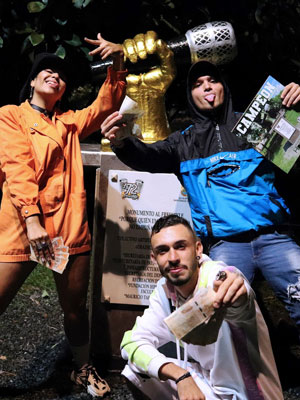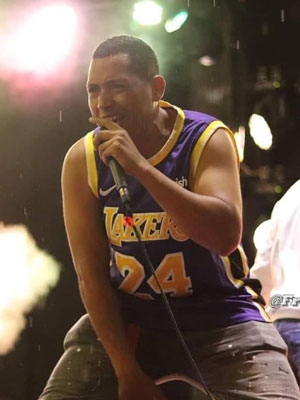With Freestyle La 72 Young Colombian Rappers Imagine a Better Future
Within the world of rap, freestyle battles - where two rappers compete, or do battle with each other, with their improvised lyrics - are all the rage. The master of ceremonies (MC), sets a beat and each rapper’s goal is to outdo their opponent with their improvised lyrics. The rapper with the slickest lyrics, the smoothest delivery and who gets the best response from the crowd wins the battle. Freestyle La 72, a Colombian Youth Foundation, is using rap freestyle battles to engage and inspire young people to make positive life choices.
Founded by Edwin Torres in 2017 in the city of Cali, Colombia, Freestyle La 72 offers young people from Cali an opportunity to learn and hone their rap freestyling skills. The aim of Freestyle La 72 is to inspire the local youth through the power of freestyle rap and to become a hub for rap freestyle in Colombia.

"When we talk about rap today, we talk about those who write the songs, but when we talk about freestyle, we’re talking about the rappers who battle. Although there are few differences between rap and freestyle, in the end the two come together and one starts with the other," explains Edwin Torres, co-founder of Freestyle La 72.
Freestyle is like riding a bicycle, they say. “A rhyme in the rap world is a rhythmic sequence of words that is pleasing to listen to, and it takes practice. We encourage young people to take part in the battles, because even if they don't win, they get a chance to practice, to gain confidence and develop their creativity. We learn freestyle by doing it. When you listen to a lot of rap, you become familiar with the style and the form, but the real learning - the staging, the nerve and the responses – comes when you let go and do battle,” Torres explains.
As a child, Torres heard his neighborhood friends talk about rap music. He was intrigued and decided to learn more about it and soon became hooked. “When I was 17 years old, I went to the Esquina del Kairos (Kairos’s Corner), a gospel and rap organization, to learn how to compose rap music. I started going to rap events in the city of Cali and there I began to understand the importance of rap. That was when I decided that part of my life would be devoted to rap music,” he explains. Today, Torres is leading Freestyle La 72 and using rap to support young people in his community and helping them to imagine a better future.
Freestyle La 72 is located in Cali’s State Park 72. That’s where Torres and his friends regularly met as teenagers to freestyle. When Freestyle La 72 started organizing freestyle tournaments, they charged rappers a USD 1 tournament participation fee, which made up the prize money for the winner.
“Fifty young people would sign up and 100 people would come to watch. We were transforming the space, giving it life and utility,” Torres explains, noting that the world’s first monument in honor of freestyle is located in the Park 72. Freestyle La 72 offers young people a platform to take part in freestyle events and hone their musical and lyrical talents. It is proving a great way to introduce these talented youngsters to the music industry and its career opportunities.
Colombian rap is on the rise

freestyle monument. The park is a magnet for young
rap freestylers. (Photo: Courtesy of Freestyle La 72)
In Colombia, rap music has become a way for people to express their disappointments and frustrations. "Rap is rooted in social movements because it brings people together,” Torres explains, adding that for him rap is a powerful artistic revolution for individual expression.
“I see rap as a way of expressing emotions, be it sadness, pain or discrimination in a community. It is a way to release and vent these feelings. We as Freestyle La 72 also have the essence of a social movement, because we are providing a new space for young people who want to use their free time to learn and practice rap,” says Torres.
Colombian rap is still young. This presents challenges for young artists seeking to break into the freestyle scene. The recent establishment of a professional freestyle league is attracting international interest, and is a positive step forward. Despite this progress, however, as yet, only a handful of rappers have found success.
Marithea, is a stand-out example. “Marithea, who first battled in La 72, went on to make history by winning the Red Bull Batalla World Final 2021, when she became the first female champion of the event,” Torres explains. "While success stories like that of Marithea are rare, and only around two out of a hundred young people make rap their full-time career, they are an inspiration for our young people."
Torres believes that there is still significant potential for rap to grow in Colombia. “The private sector in the Colombian rap industry is still consolidating, and if it continues to support these artists, there is potential for them to lead a respectable life rap professionals,” he says.
The IP in freestyle battles

pain, or discrimination in a community. It's a way to
release and vent these feelings,” says Edwin Torres,
founder of Freestyle La 72.
(Photo: Courtesy of Freestyle La 72)
Torres notes that most young rappers in Cali are not familiar with intellectual property (IP) and highlights the importance of raising IP awareness among them, so they are well positioned to cash in on their success. “If a song is successful, they need to know how to claim royalties. This is something that many aspiring artists overlook because they lack guidance,” says Torres. He notes, however, that despite the creativity involved in freestyle battles, freestyle artists may not receive the same recognition as popular artists who release a hit single. “Freestyle battles require a constant flow of creativity and ideas, yet people often don’t recognize the hard work that is put into it if the result isn’t recorded as a music track,” he adds.
Torres learned the importance of IP when someone used his song on social media without permission. “The mistake came from a lack of knowledge of copyright procedures on the part of the person who used my song,” he says. Poor IP awareness and understanding has led to several copyright infringements in freestyle battles and “this practice is harmful to both our organization and the freestyle movement, and it also affects your credibility as a rapper,” he reflects.
While Freestyle La 72 does not offer formal training on IP issues for young rappers, Torres provides assistance on the subject if requested. "We help people understand that IP is valuable and belongs to them. We must strive to educate them about the importance of protecting and valuing their work," Torres says.
Innovation and creativity are at heart of Freestyle La 72 and its drive to continue introducing new forms and formats of freestyle. “Both artists and the organization engage in constant creation to push the boundaries of freestyle performances, no matter how insignificant they may seem,” Torres notes, emphasizing the need for constant innovation to remain relevant in the world of freestyle.
Torres envisions a future where Freestyle La 72 moves beyond music to include other forms of artistic expression, bringing together a variety of expressive arts by Cali's young people and providing them with opportunities to develop their creativity and their future careers.
